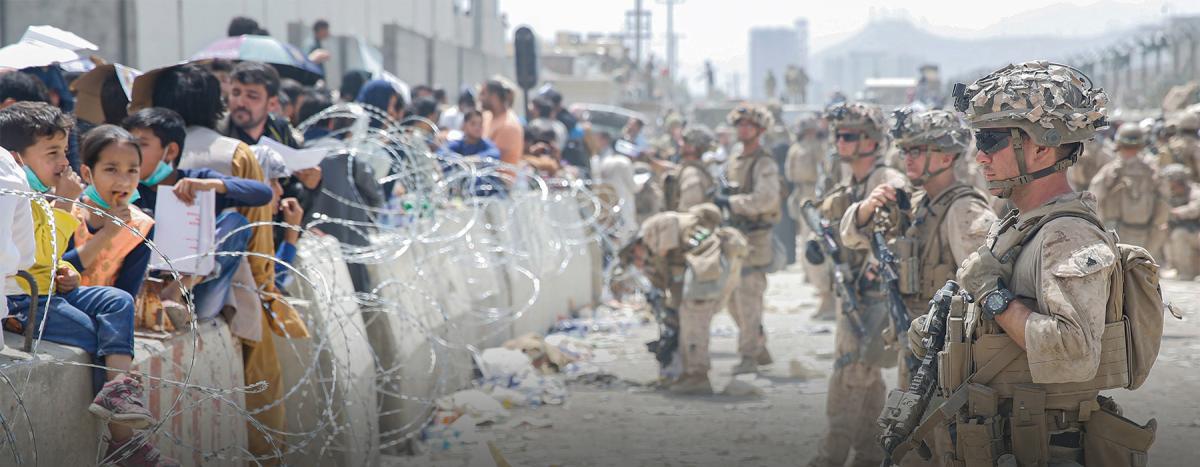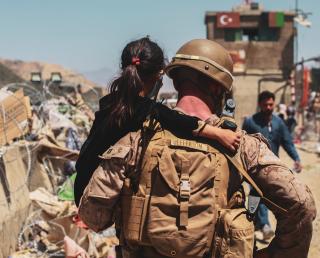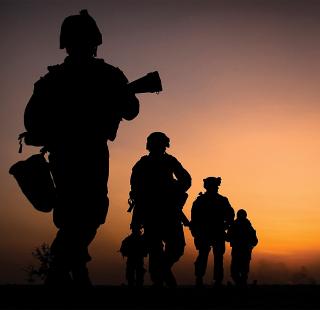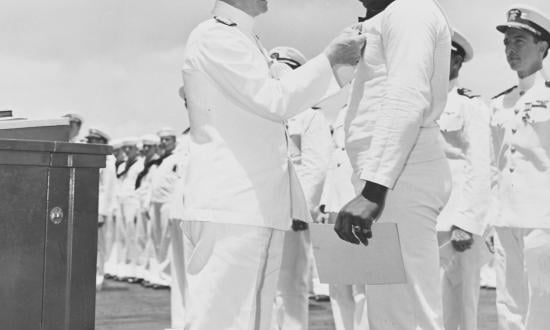“Please help me get out of Afghanistan!”
So began the latest message from one of the many Afghans who had served alongside me while I was deployed for Operation Enduring Freedom. Amid the U.S. withdrawal, Afghanistan’s government collapsed beneath the Taliban advance. Afghans who had served in support of the coalition and Afghan national security forces—whether as interpreters, soldiers, police, or any other form of support—were now at risk. Capture, persecution, torture, and death was the fate of many of those who could not escape.
Thousands of miles away, a loose network of the Marines and previously immigrated Afghans from our deployment set to work on this latest case, helping to gather documents and write letters of recommendation for special immigrant visas. We were but a microcosm of the “Digital Dunkirk” unfolding across the world in real time: veterans and nonprofits working informally with the Department of Defense, the interagency, and other international organizations to evacuate those Afghans who had thrown their lot in with the U.S. cause.1
While this effort yielded successes, there were just as many failures. Challenges as varied as throughput limitations, strategically limiting timelines, and bureaucratic hurdles meant many of those eligible for evacuation were left behind.2 Among our network’s own limited efforts, only 3 of the 15 cases we are working have made it out. Some are still alive and in hiding. In other cases, we have lost contact and fear the worst.
In the conversations following the Afghanistan withdrawal, those of us who served in country could not help but see the failures of the withdrawal as an echo of the failures of the war in Afghanistan writ large. On top of that was the realization that we had lost the war. For a force that prides itself on fighting battles and winning wars, this is a bitter pill to swallow. Personally, I was in a tailspin. I had been taught how to lead Marines to victory. No one had ever taught me how to lead Marines through defeat.
Admitting defeat is agonizing. Learning from defeat can be even more painful, as it demands a deliberate examination of one’s own shortcomings. The instinct of the U.S. military is to ignore the wars we lost and focus on the wars we want to win. We prefer to pivot toward the future and jettison the uncomfortable past. Strategic imperatives demand shifting priorities to peer adversaries, but the services are more than happy to divest of the organizations and programs that remind them of the small wars and insurgencies with which they struggled so mightily. It is as though the military itself wants to avoid the pain of self-examination. With every removal of small wars instruction from professional military education, and with every closure of a counterinsurgency and security cooperation focused unit, the services cry: “Please help me forget about Afghanistan!”
Those who served in this and other theaters in the war on terrorism must reconcile ourselves with this defeat. More than that, it is imperative to model how to lead through defeat. As leaders, we must keep faith with our brothers and sisters in arms, keep faith with our allies and partners, and ruthlessly learn from the past so we are better prepared to fight and win the next small war or insurgency.
Keeping Faith with Service Members
“It’s my fault.” “I didn’t do enough.” “If only I’d given a little more.” These are common refrains among those who served in these and other lost wars. The irony is that the refrain is so common among those at the tactical end, where one has little if any influence over strategy and policy.3 Junior enlisted, noncommissioned officers, staff noncommissioned officers, and junior and midgrade officers will readily presume their own guilt in contributing to defeat. It should not be surprising; we are indoctrinated as leaders to believe that we are responsible for everything our units do or fail to do. One of the Marine Corps’ leadership principles is “Seek responsibility and take responsibility for your actions.” When the buck stops with you, you cannot help but feel responsible when your nation loses a war.
But these tactical leaders are assuming responsibility for failures of policy and strategy. In turn, they are wracked with overwhelming guilt that is not theirs to bear. Such guilt is poisonous to the mental and moral health of individuals and units and can be a key contributor to moral injury and the risk of suicide.4
A key function of leaders in war is to relieve those we lead of such unnecessary burdens. When a unit leader gives the order to fire, the rifleman who fires a killing shot should know that the blood is not on his hands. This moral transfer should repeat itself up the chain to those who design strategy and policy. Those in combat are ultimately executing policy, and so long as they do so legally, ethically, and morally, combatants should feel that their souls and honor are clean. This is easier said than done, but it begins with leaders telling their subordinates they did what was asked of them and did it right.
In defeat, leaders must perform the same role for those who fought and lost. The Commandant of the Marine Corps and the Sergeant Major of the Marine Corps provided a master class on this duty in their “Letter to Marines on Afghanistan.” In noting that those who served might be struggling with the question, “Was it all worth it?” they offered the words their Marines needed to hear:
We both believe—without question—that your service was meaningful, powerful, and important. You answered the call to serve, proudly carrying the torch of so many generations of Marines before you. You put the good of others before yourself. . . . You never, ever gave up. You lived with purpose, with intention. Whether you realize it or not, you set an example for subsequent generations of Marines—and Americans—by living our core values of Honor, Courage, and Commitment.5
Active-duty and veteran leaders at every echelon should embrace this message and offer it to those with whom they served—and those who will serve after us.
Keeping Faith with Allies and Partners
While the coalition was strategically defeated, tactical and operational successes abounded across Afghanistan. Such successes would have been impossible without the services rendered by our Afghan partners.
The United States lacked any meaningful Afghan linguistic and cultural expertise and could only navigate the human terrain of Afghanistan with the assistance of Afghan partners.6 Moreover, no coalition partner was willing or able to deploy the concentrations of manpower needed to conduct counterinsurgency operations across the entire country, and absolutely depended on the service of Afghan national security forces.
While Afghans’ motivations for volunteering to stand against the Taliban and other competing factions varied, the risk was real for all of them. Afghan interpreters and security forces were subjected to the same attacks as their coalition partners. Moreover, while coalition partners redeployed and would eventually withdraw, these Afghan volunteers would remain behind in the midst of an insurgency. In that sense, many such Afghans assumed far greater risk than the average U.S. service member who deployed to Afghanistan.
The coalition efforts to evacuate eligible Afghans prior to the final U.S. withdrawal aimed to honor this sacrifice and keep faith with our partners. Tragically, many of these partners were left behind.
But while the highly visible and time-compressed official evacuation might have come to an end, this does not mean efforts to evacuate our partners must come to an end. The work to help our Afghan partners has simply entered a new stage and will in turn become a protracted war all its own. Service members, veterans, and others can continue to aid eligible Afghans by facilitating special immigrant visas, the Priority 2 program, supporting applications for asylum, and other means.7
The paths for evacuation are long and difficult, but they remain open. By continuing such efforts and encouraging others to do the same, leaders can help keep faith with our partners and give another path of meaning for those dealing with the sting of defeat. In addition, an enduring commitment to helping Afghans evacuate will support strategic messaging in future campaigns wherein the United States must rely on local support and cultural expertise for tactical and operational success.
Keeping Faith with the Next Generation
To ensure the military is ready for the next small war or insurgency, it is imperative that this war’s lessons are retained and the causes of defeat are studied in detail. But learning from lost wars the nation did not want to fight is something the U.S. military does not do well.
At the conclusion of the Banana Wars, while the Marine Corps collected best practices in its Small Wars manual, the needs of World War II and the ensuing Cold War led the services to trivialize small wars training and education.8 The need for this expertise arose again during the Vietnam War. At that war’s end the military pivoted once more back to its preferred focus on high-end combat with a peer enemy. This trend continues, despite the fact that the U.S. military is almost habitually involved in small wars and conducts high-end, conventional warfare perhaps once a generation.9
The common theme is that the U.S. military prefers to train, equip, and prepare for the high-end wars it rarely fights but easily understands, rather than the small, messy, unglamorous wars it commonly, but reluctantly, must wage.10
While the services cannot be faulted for pivoting to priorities dictated by national security strategies and national defense strategies, they also should advocate for the resources that will prepare their personnel to succeed in the many small wars to come. Among the organizations that have closed or will close are the Marine Corps Advisor Training Group, the Center for Advanced Operational Cultural Learning, the Marine Corps Security Cooperation Group, and the Army’s Asymmetric Warfare Group. While these specific organizations may not be the precise requirement for future small wars, the services must develop a deliberate approach to retaining and transmitting their hard-won experience, or they will have to pay for these lessons once more in blood.
Further, dissecting this defeat will demand institutional courage, as it requires self-reflection in identifying policies and strategies that failed. This task is made more unsavory as it will naturally identify senior leaders who advocated for failed strategies and complicate their legacies. Certain corners of the institution itself may push back against this painful introspection. But any leader worth his or her salt will prioritize the coming missions and their people over hollow pride.
No one trains to lead through defeat, yet U.S. military leaders must accomplish this task to ensure troop welfare and prepare for the next war. Military leaders must deliberately convey to those who served that they did their duty well and set the example for those to come. The harder part is acknowledging that the moral responsibility for a war’s outcome resides at the top and not at the bottom of the chain of command. By honestly doing so, senior military leaders can help their people live with how their war ended. But by continuing to help our Afghan partners evacuate, the services can keep faith with those who supported us and increase the likelihood that locals will throw their lot in with the United States in future small wars.
Most important, the services must ruthlessly examine the lessons of the war and preserve the organizations charged with transmitting the knowledge gained. Only by learning to effectively lead through this horrific defeat will we be better prepared to win the next inevitable small war.
1. Laura Keenan, “Digital Dunkirk: What the Afghan Evacuation Should Teach Us About the Future of Volunteer Support to the U.S. Military,” Modern War Institute, 22 September 2021.
2. Robbie Gramer, Jack Detsch, and Amy Mackinnon, “Those Left Behind in Afghanistan,” Foreign Policy, 1 October 2021.
3. Melanie Burney and Marina Affo, “Could We Have Done More? Veterans Share Mixed Feelings About U.S. Withdrawal from Afghanistan,” The Philadelphia Inquirer, 16 August 2021.
4. Michelle L. Kelly et al., “Moral Injury and Suicidality Among Combat-Wounded Veterans: The Moderating Effects of Social Connectedness and Self-Compassion,” Psychological Trauma 11, no. 6 (2019): 621–29.
5. Gen David Berger, USMC, and SgtMaj Troy E. Black, USMC, “Letter to Marines on Afghanistan,” USNI News, 18 August 2021.
6. Diana Jean Schemo, “A Nation Challenged: The Academics; U.S. Finds Itself Lacking Experts on Afghanistan,” The New York Times, 11 October 2001.
7. The World staff, “How to Help Afghans Right Now,” The World, 26 August 2021.
8. Keith Bickel, Mars Learning: The Marine Corps’ Development of Small Wars Doctrine, 1915–1940 (Boulder, CO: Westview Press, 2000), 187.
9. Max Boot, The Savage Wars of Peace: Small Wars and the Rise of American Power (New York: Basic Books, 2002), xiv.
10. Michael O’Hanlon, “America’s History of Counterinsurgency,” Brookings Counterinsurgency and Pakistan Paper Series no. 4 (Washington, DC: Brookings Institution, 2009), 3.








